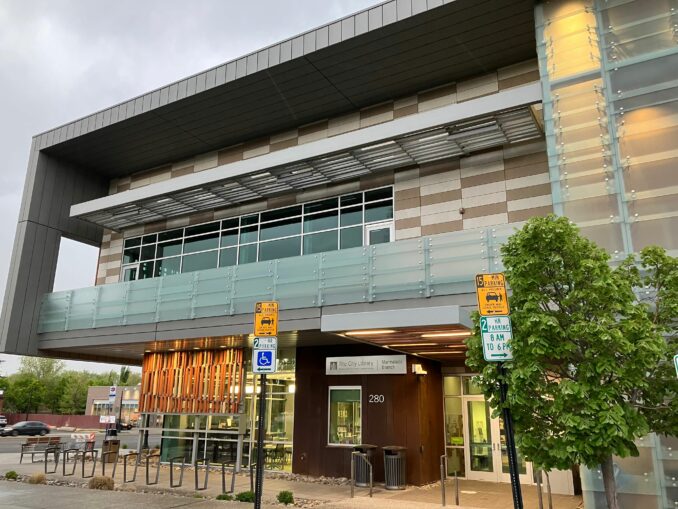Young workers drive union effort at Salt Lake City Public Library
Salt Lake City
Salt Lake City Public Library employees gathered outside the main branch in the downtown area on April 24 and announced their intent to form a union.

Marmalade branch of the Salt Lake City Library system. WW PHOTO: J.M. Straughn
The struggle to move to this phase has been several years in the making. According to sources close to the organizing efforts, feelings of being disrespected have been growing, adding insult to the injury of low wages for library aides and assistant librarians. This writer spoke with some of the library workers.
“There are supervisors who won’t use they/them pronouns, not out of just forgetting but just acting dismissive when you ask to have them used correctly,” according to one of the library workers involved in early organizing.
“There’s a lot of ableism. It’s hard to get time off, and they don’t take chronic pain and illness seriously,” another confided. Moreover, “we’ve seen them promote men over women to full librarian time-and-time again, even when the women have more advanced degrees and seniority.”
In addition to these concerns, more than one library worker has noted that the library system has been delegated by the city government to act as its main network of community centers. There’s nothing wrong with that in principle; many of the library’s patrons have remarked that the ability to use meeting rooms for community organizing has been an important public service. The difficulties arise when crises produced by the capitalist system converge onto staff, who are not given the resources to respond to those crises, let alone resolve them.
Library workers put in difficult situations
Patrons experiencing mental health breakdowns are a common occurrence, and these incidents can be extreme. For example, the architecture of the main branch library was designed to allow a scenic ascent to the roof, but the roof has had to be closed more than once to stave off jumpers.
At one point, the Volunteers of America shared space with the library and were on hand to help direct people in need toward resources, but the entire staff of social workers recently resigned en masse from VOA, due to low pay and unacceptable working conditions.
Library workers reported, however, that the presence of the VOA had been an uneasy partnership. Since VOA social workers worked entirely independently of library workers, there wasn’t any agreement about whether they could be available to assist with any incidents taking place in the library.
Even when social workers had been trained in sensitivity and de-escalation, their primary role was to direct people in need toward local resources. Yet those resources were frequently nowhere to be found, especially for the rising numbers of unhoused neighbors in an area with soaring rents and declining numbers of temporary beds.
Some young library workers have also expressed feeling threatened. The political atmosphere can be tense, in a state where reactionaries heavily dominate cultural and political halls of power. “I’m standing at the book checkout, where I believe I should feel pride in being queer, when a patron comes up with swastika tattoos, asking for neo-Nazi related numbers on his new library card; and the way he looked at me gave me a chill.”
Young workers describe their experience in building union solidarity as one that offers a glimmer of encouragement and strength, in a time of declining hopes, for a job that provides economic stability, personal safety and simply feeling one’s humanity acknowledged.

